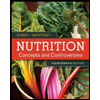
Bundle: Nutrition: Concepts and Controversies, Loose-leaf Version, 14th + LMS Integrated for MindTap Nutrition, 1 term (6 months) Printed Access Card
14th Edition
ISBN: 9781337127547
Author: Frances Sizer, Ellie Whitney
Publisher: Cengage Learning
expand_more
expand_more
format_list_bulleted
Concept explainers
Question
Chapter 13, Problem 1CT
Summary Introduction
To analyze:
The people who are responsible for childhood obesity. The changes that can make a family to combat obesity.
Introduction:
Obesity takes a heavy toll on the well-being of a child. Education is urgently needed as most parents do not recognize the development of obesity in their own children, let alone the associated health risks it may pose.
Expert Solution & Answer
Trending nowThis is a popular solution!

Chapter 13 Solutions
Bundle: Nutrition: Concepts and Controversies, Loose-leaf Version, 14th + LMS Integrated for MindTap Nutrition, 1 term (6 months) Printed Access Card
Ch. 13 - Prob. 1RQCh. 13 - Prob. 2RQCh. 13 - Prob. 3RQCh. 13 - Prob. 1CTCh. 13 - Prob. 2CTCh. 13 - Prob. 1SCCh. 13 - Prob. 2SCCh. 13 - A deficiency of which nutrient during pregnancy...Ch. 13 - Prob. 4SCCh. 13 - Which of the following preventative measures...
Ch. 13 - Prob. 6SCCh. 13 - Prob. 7SCCh. 13 - Prob. 8SCCh. 13 - Without proper management, type 1 or type 2...Ch. 13 - Prob. 10SCCh. 13 - Prob. 11SCCh. 13 - Prob. 12SCCh. 13 - Prob. 13SCCh. 13 - Prob. 14SCCh. 13 - Prob. 15SCCh. 13 - Prob. 16SCCh. 13 - Prob. 17SCCh. 13 - Prob. 18SCCh. 13 - Prob. 19SCCh. 13 - Prob. 20SC
Knowledge Booster
Learn more about
Need a deep-dive on the concept behind this application? Look no further. Learn more about this topic, health-nutrition and related others by exploring similar questions and additional content below.Similar questions
- When a child has a chronic condition that limits activity, such as spina bifida, what is the greatest long-term nutrition concern? a. Protein limiting growth b. Modified food textures to avoid eating difficulties c. Excessive calorie intake further limiting mobility d. Intake of calcium and vitamin D to prevent bone fracturesarrow_forwardWhen a child with ADHD refuses to eat, what are two possible explanations?arrow_forwardWhich is a true statement about limiting nutrients in infancy? a. Iron supplementation is initiated when infants are six months of age. b. Vitamin D supplementation is needed in breastfed infants because the content is low in breast milk. c. Low intake of dietary fiber is a common cause of constipation in infants. d. Fluoride is not needed until teeth start erupting in late infancy.arrow_forward
Recommended textbooks for you
 Nutrition: Concepts and Controversies - Standalo...Health & NutritionISBN:9781305627994Author:Frances Sizer, Ellie WhitneyPublisher:Brooks Cole
Nutrition: Concepts and Controversies - Standalo...Health & NutritionISBN:9781305627994Author:Frances Sizer, Ellie WhitneyPublisher:Brooks Cole Nutrition Through The Life CycleHealth & NutritionISBN:9781337919333Author:Brown, Judith E.Publisher:Cengage Learning,
Nutrition Through The Life CycleHealth & NutritionISBN:9781337919333Author:Brown, Judith E.Publisher:Cengage Learning,- Health Safety And Nutrition F/Young ChildHealth & NutritionISBN:9781305144767Author:MAROTZPublisher:Cengage

Nutrition: Concepts and Controversies - Standalo...
Health & Nutrition
ISBN:9781305627994
Author:Frances Sizer, Ellie Whitney
Publisher:Brooks Cole

Nutrition Through The Life Cycle
Health & Nutrition
ISBN:9781337919333
Author:Brown, Judith E.
Publisher:Cengage Learning,


Health Safety And Nutrition F/Young Child
Health & Nutrition
ISBN:9781305144767
Author:MAROTZ
Publisher:Cengage

